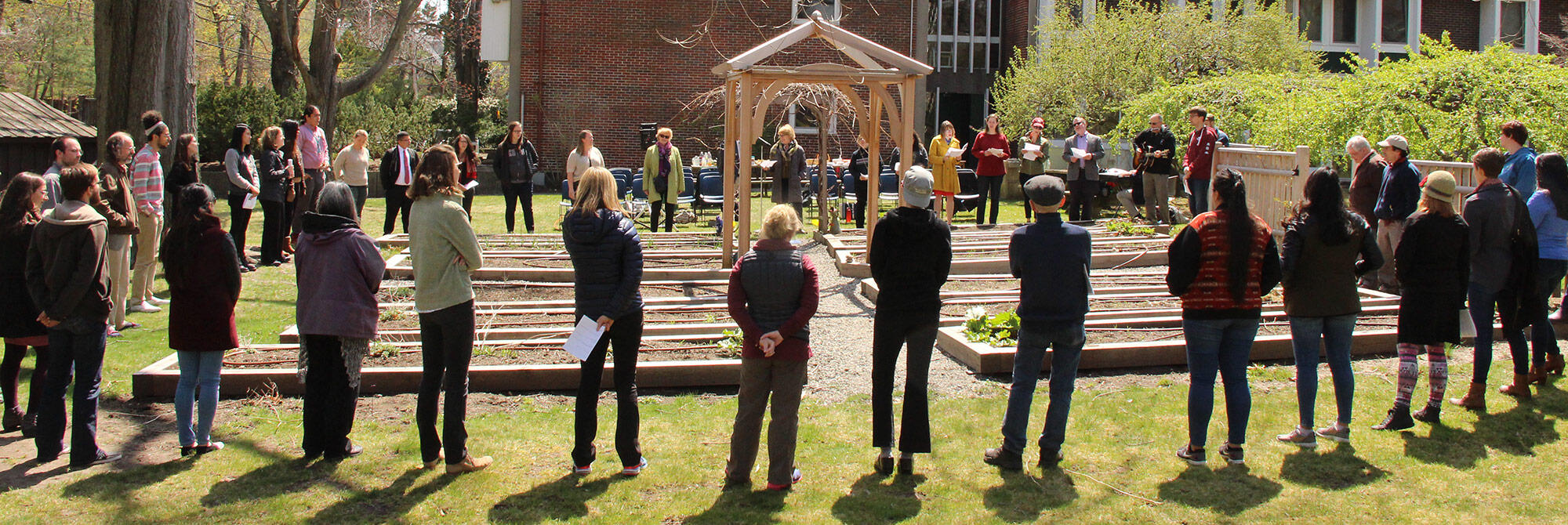As a steward of Harvard University’s original mission—to educate ethical leaders who work for a better world—HDS is a campus leader in environmental sustainability.
Values
Care of our environment is a core value among the community of the Harvard Divinity School. Staff, faculty, and student volunteers from across the School collaborate to educate and create change within the community and to enable a more sustainable future through present action.
Sustainability Highlights
-
HDS sustainably purchases 100 percent of the campus electrical power through REC (renewable energy credits) using wind power and biomass for HDS electrical needs.
-
HDS introduced a green cleaning program in 2004, the first School at Harvard to do so. The green cleaning program begun out of a concern for occupant health through improved indoor air quality.
-
100 percent organic landscaping.
-
Achieved LEED Gold certification in 2009 at the revitalized Rockefeller Hall, and in 2014 for large classroom and auditorium upgrades across campus.
-
Installed solar panels at CSWR.
-
HDS is one of the University leaders in waste reduction.
-
Grows and donates fresh produce to a local food bank in Cambridge.
HDS Garden Group
The Harvard Divinity School Garden, located on campus between the Women’s Studies in Religion Program and the Center for the Study of World Religion, serves the needs of the HDS community, broadly conceived, for local, organic food, while educating community members on the ethical issues, individual, communal, and global, that surround sustainable food production and consumption.
A sacred space, the garden exists to inspire and nurture relationships between students, staff, and faculty, between our community and the land, the local ecosystem, and local food. All are welcomed to share this space. Follow us on Facebook or on Instagram!
Waste Reduction
First Reuse, Then Reduce: Waste reduction at HDS focuses around reuse. The HDS Green Team hosts monthly freecycle swaps, organized around a type of good that the community can exchange. Surplus items are donated to charity.
Purchasing: The HDS Green Team encourages staff to think before purchasing and to always consider the environmental impact. It is HDS policy that all electronics purchased have the Energy Star label. Computer related equipment must also be EPEAT certified.
Compost: HDS composts food and all dinnerware in its cafeteria. Major events, such as Commencement, are all zero waste events.
Recycling: HDS employs single stream recycling. E-waste can be recycled in tubes provided at all HDS building entrances and in all departments.
Energy and Emissions
Energy reduction in commercial buildings largely results from four factors: matching energy load exactly to demand, equipment maintenance, trending to ensure equipment performance, and the integration of new technologies.
Energy reduction measures:
-
Indoor air quality sensing and control including variable speed drives.
-
Use of the latest lighting technologies in all HDS buildings.
-
Increased use of digital equipment controls that allow us to control energy parameters, schedule equipment and employ optimal start/stop optimization.
-
Preventative maintenance programs that track equipment efficiency.
-
HDS sustainably purchases 100 percent of the campus electrical power through renewable energy credits.
-
Following energy audits in 2009, HDS identified opportunity for 88 Energy Conservation Measures (ECMs). The implementation of these measures has reduced the School's greenhouse gas footprint 21 percent, compared to 2006 levels.
-
The HDS Operations Department explores energy savings measures across campus annually.
HDS Green Team Goals
Education and cultural change through the sharing of information and ideas.
Create a sustainable community that will reflect a reduced global footprint.
Maintain a history that will transparently share our ideas with the larger community.
Provide and gather resources and ideas to share with the community.
Swartz Hall Renovation: The Vision
By renewing the heart of the School’s campus, Swartz Hall, HDS seeks to create a model learning and research environment that transforms the way scholars and students engage the world and each other.
Read more about how the project progressed by visiting the Swartz Hall Renovation blog.
The project’s highlights include:
-
The creation of a true campus center that brings the School’s core academic resources together with student services and social space.
-
A new 200-seat auditorium for conferences and public conversations on religion with global leaders.
-
Modernized classrooms suited to new ways of teaching and learning, with flexible spaces and a new multimedia infrastructure.
-
A multifaith chapel that welcomes students of all religions, and where all members of HDS community may gather to worship, perform, and share experiences.
-
Full accessibility throughout the building for people of all physical abilities.
-
Emphasis on healthy building materials.
-
Improved energy efficient building envelope (expecting to achieve a minimum of LEED gold).
The Renewal of Swartz Hall




